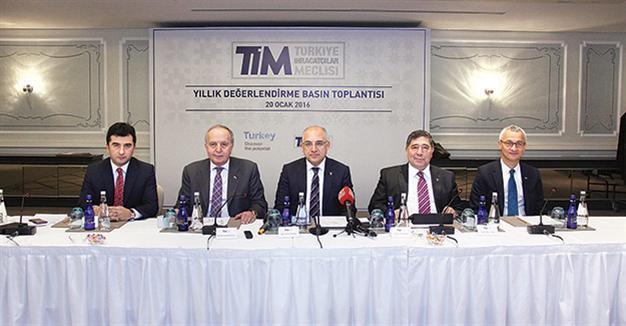Turkish exporters’ high hopes for Iranian market
ISTANBUL

Turkish exports may rise between 8 and 10 percent with the end of sanctions on neighboring Iran following its nuclear deal with world powers, the head of the Turkish Exporters’ Assembly (TİM) said on Jan. 20 in a press meeting.
Key sectors for Turkish companies in Iran are automotive, clothing, textiles, machinery, furniture and chemicals, said TİM President Mehmet Büyükekşi.
“Our exports to Iran will make around 8-10 percent of positive contribution to our total exports over this year. In the long term, this [number] will become even higher,” he said.
Turkey will open trade centers in 2016 in Iran as well as in the United Arab Emirates, Germany, Britain and the United States to boost its exports, which are targeted to rise to $155.5 billion this year from $144 billion with around a $12.6 billion loss due to parity fluctuations in 2015, by mainly focusing on the European Union market, he said.
“In a bid to boost our exports to Iran, we have searched opportunities sector by sector. We have been in talks with our Iranian counterparts. Now we are looking for a place to launch a permanent trade center in Iran. We’ll pick up one of a couple of three-story buildings in Iran. We plan to use one story for bilateral talks and another to open representative offices for leading sectors, including automotive, ready-made clothing, chemicals, machinery, furniture and home appliances sectors. We may allocate one story for the services of Turkish Airlines, which already has flights to six destinations in Iran. We’ll thus get ahead of competitive countries,” he said.
He noted that Iran made around $40 billion worth imports annually and has over $404 billion of gross domestic product (GDP).
“Improved money transfers with the lifting of sanctions will strengthen our hands…We expect many Iranian companies to build stronger ties with Turkish companies. We believe that Turkish companies will offer considerable opportunities to their Iranian counterparts,” he added.
Büyükekşi said another main priority of Turkish exporters will be diversifying export markets and boosting ties with their main market, the EU.
“We also expect some recovery in our exports to Israel and Egypt. We’ll visit Latin America in the upcoming days. We are also in search of new markets over there,” he said.
Büyükeşi said Turkey’s exports to Russia regressed from around $6 billion to $3.7 billion last year due to economic problems in Russia.
“We had already foreseen no increase and even some decline in our exports to Russia before the jet crisis erupted,” he said.
 Turkish exports may rise between 8 and 10 percent with the end of sanctions on neighboring Iran following its nuclear deal with world powers, the head of the Turkish Exporters’ Assembly (TİM) said on Jan. 20 in a press meeting.
Turkish exports may rise between 8 and 10 percent with the end of sanctions on neighboring Iran following its nuclear deal with world powers, the head of the Turkish Exporters’ Assembly (TİM) said on Jan. 20 in a press meeting.